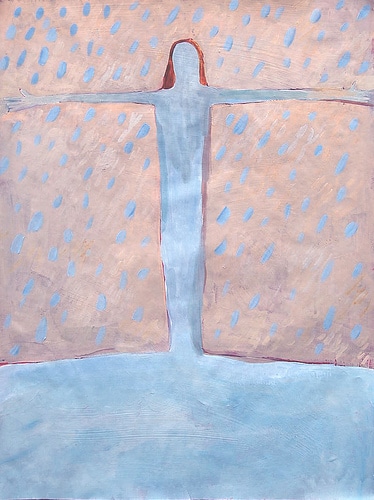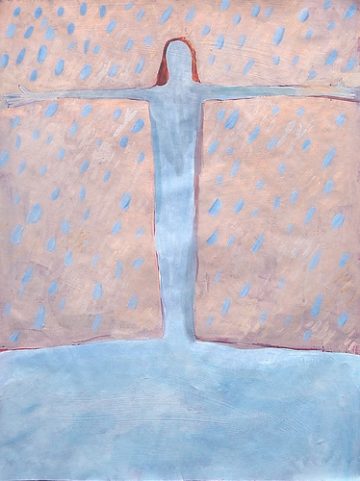by G
When I stopped attending the LDS church last year I started visiting other local worship services and I found myself in the embarrassing situation of weeping in public. (Two Sundays in a row!) It started at the Episcopalian church. The building was extraordinary, a mini cathedral (to my eyes at least.) The sermon was inspiring, a delightful interpretation of the scriptures and I felt that clear burning sensation that I associate with feeling the spirit. Then it came time for partaking of the Eucharist. Now I had been looking forward to this part (especially since reading Take This Bread), curious and hoping it would be acceptable for a visitor to participate (sort of like trying some new foreign food). I was relieved when it was made very clear that this Eucharist was open to anyone who wanted it… and then became completely baffled when I began to weep as I stood to walk to the front (I was just one in a crowd of people moving up to the alter.) I was doing my best to be discreet, but still. Up at the front, we knelt on a padded bench and a priest came and put a small thin round wafer in each of our hands and said “body of Christ” (or something like that) and at this point I am trying really to hard to keep it under control, but my weeping is obvious to anyone who looks at my face. Then the priest comes around with a cup of wine for us to dip the wafer in. “Blood of Christ”. And I ate it and wept. Back at my pew it took me a good while to stem the flood and the whole time I am thinking “Get a Grip!!!” What was that?
Then the next week I visited a United Congregational Church. Totally different feel from the Episcopalians, no vaulted ceilings, no crosses, no biblically themed stained-glass, no elegant pews with special padded benches for kneeling. It was rather plain with folding chairs, some stylized “unify-the-world” type paintings and a rock band set up at the front. The service had lots of music, a reading from the Book of Acts and a sermon by the pastor (a friendly funny woman) about leaving the Comfortable in order to follow God. Still Christian themed, but much looser than the Episcopalian sermon. It was all actually very inspiring and I felt the spirit strongly again. At this church a big loaf of crusty french bread was used instead of a wafer, and it was dipped in grape juice instead of wine, and there was none of the pomp and ceremony of the Eucharist ritual. But once again I found myself getting a tiny bit teary-eyed as I waited with the other parishioners for my bit of “Jesus snack”. Not much, nothing like last week, just a little wet around the eyes. “Cool” I though, “I got this under control”. Until it was my turn and this friendly funny young woman tore off a piece of bread, put it in my hand looked in my eyes and said “even for you”. And I sort of crumpled, and tears started pouring out. What was that?
I have revisited these churches (and others) several times and no longer weep when it comes time for the sacrament ritual. But I have wondered what was it that affected me like that initially. Maybe it was the active participation required; the need to stand up and go get it which heightens the emotional vulnerability for a newcomer. But in addition, I think it also has a lot to do with my craving for sacred ceremony and spiritual ritual. I was always very aware that the sacrament was supposed to be that, but even when I was trying really hard to focus and ponder the atonement it seemed the bread and water would come and go in a haze of a routine rendered invisible because of it’s familiarity. And more recently it had merely become an uncomfortable moment: should I take it? If I do, will the bishop try to intervene?
This craving I felt for a sacred ceremony closely aligns with what I sought in the temple. In fact, the last time I remember weeping in church like this was when I was sitting in Sunday School and had the strong impression that I should give up my temple recommend. When I had that thought and knew it was a true one, I began to cry hard and beat a hasty exist from the class. Yet, at that point attending the temple had been mentally arduous and painful for quite some time, not a place of solace or spirituality for me at all. However, it was my only available outlet for a spiritual ritual. For a sacred ceremony. It hurt to lose that, or at least to lose the idea of what I wanted it to be.
I’m still not sure all the reasons my emotions reacted the way they did: Perhaps a bit of pain from the sense of losing my community? A twinge of guilt for betraying my community? Maybe a sense of relief at finding alternate venues for meaningful ritual? I’m not sure. It’s complicated.
Meanwhile, I have begun attending the lds church again but refrain from partaking of the sacrament. Also I plan is to continue visiting other churches (and partaking of whatever communions they offer). And in general, to just keep putting one foot in front of the other as I figure this out and find the things that work for me and my little family.
I stepped from Plank to Plank
A slow and cautious way
The Stars about my Head I felt
About my Feet the Sea.
I knew not but the next
Would be my final inch —
This gave me that precarious Gait
Some call Experience.
-Emily Dickinson







12 Responses
G, This is a beautiful telling of your experience. Thanks for sharing it. I feel like I have been in your same shoes recently, having visited the Methodist church a few times recently. I think that I also crave more ritual in my religious life.
I am thinking of going back to my LDS ward next week or so (I haven’t been in a while because of my new baby), and I wonder why you feel that you cannot take the sacrament there. I had not thought of this in regard to my return, and I am wondering your thoughts/reasons.
I had a Jewish friend, now deceased, who attended Catholic mass and received communion. She was, of course, unbaptized, and the priest knew her quite well. Catholics do not have an open communion, nevertheless, she received communion. She often wept: joyfully, it seemed to me. I don’t know why. But perhaps it was similar to your experience.
thank you kmillecam. My background is from a staunchly traditional version of the doctrine where you don’t take the sacrament unless you are living (or trying to live) the (lds) gospel. I remember hearing stories of bishops intervening to prevent some sinner from partaking of the sacrament (in the best interest of the sinner of course).
I don’t know if my bishop would say yes or no if I asked him whether I should take the sacrament. I don’t plan on asking him. I have some hangups about putting myself in a situation where a church leader feels he can judge my worthiness and currently I am dealing with that by opting out of the system entirely.
President Packer addressed the sacrament issue when I was in the MTC. He ordered all of us totake the carament unless we had either been asked y the Bishop to stop or we had done something severe enough to need to talk to the Bishop. My Stake presidency member that attends our ward confirmed that that is the official line in the sand. But I relaize everyone needs to make peace with this themselves.
You’re not alone in your need for a deeper spiritual ritual. I go to midnight mass for this reason.
Dear G:
Like you perhaps, my soul also longs for more sacred ceremony in LDS practice. Ceremony such as this, in my experience, is inherently feminine in spirit; and the Sacred Feminine is sadly lacking in LDS worship practices, which to me often feel like business meetings at a high tech firm (we have a lot of them, and a lot of engineers in my area).
I love the ceremony of Mass, and too have often felt the spirit when attending with friends.
For me it is hard to experience reverence and awe for what Jesus really did for us through the Atonement, Crucifixion and Resurrection, when there is so much NOISE in the chapel during the entire meeting – noise not just from small children, but older ones too, and their parents who talk “sotto voce” and think it disturbs no one, but it all adds up to a dull roar. How sacred and reverent is that?
I grew up as a Presbyterian, and in that church, unconfirmed people, no matter the age, did not take communion, which I believe was part of the Sunday worship service only monthly.
That to me, made communion so special, a privalege that you were given, like any other lifecycle event, such as baptism or Bar/Bat Mitzvah, when you reached a certain important and celebrated milestone in your life.
My husband and I think the Sacrament in our church has sadly become very common and ordinary, when there is so little ceremony around it, and it is given routinely to even the smallest child able to eat solid food, when mom or dad pushes it into their mouths.
I think because of this on a subconscious level, children in our church learn to associate going to church with eating snacks, which is why there is so much snacking that goes on in our chapel. I even observed one mother giving her preschoolers’ FRIED CHICKEN during Sacrament meeting one time!
For this reason, if I were raising my children again, I would not routinely give them the sacrament from their earliest toddlerhood, but introduce it to them later, when they could have some understanding of why we do this, and feel the love and gratitude for the Savior that the ceremony is intended to evoke – perhaps around the age of 5.
As far as ceremony goes, I have started creating my own rituals and ceremonies. For Easter, I hostessed a Brunch for sisters in my ward, held specifically and purposely on Good Friday. I served symbolic food, we talked about Easter symbolism, then we read a Readers’ Theater, sharing the story of Easter week, and the Resurrection from the point of view of the women who were there.
It was very emotional and soul-satisfying for me and for others. I plan to host an Easter event annually. I also plan to hold a Passover Seder next year.
I have started doing seasonal rituals that tie into the changing seasons, the lunar cycles, etc, similar to what Sarah taught the ancient Israelite women.
I have been GREATLY inspired from reading Sue Monk Kidd’s book, “Dance of the Dissident Daughter: A Woman’s Journey from Christian Tradition to the Divine Feminine” (which sat on my bookshelf for two years before I finally read it last fall!)
Gatherings such as the Sophia Gathering, the Rocky Mountain Retreat, the retreat in Boston, could be places, times and gatherings where we as LDS women create and experience more sacred ceremony and ritual, and thereby feed our feminine souls. We need it, and the Church needs it.
Love and blessings to you.
I have been visiting several churches myself lately. your post was insightful.
I cried in the first Quaker service I went to. No ritual, just absolute silence. It healed my heart.
I think sometimes Mormon’s feel they have a monopoly on the Spirit (being ‘the only true church,’ etc). They don’t.
I have felt the same peace at the mass for my grandfather’s passing. I have felt it listening to radio and evangelical sermons.
And I feel it when practicing yoga. The single most powerful experience being when I sobbed during the final rest pose (savasana) shortly after the election last year. There a ritual of sorts, and a totally relaxed and tired body, caused my soul to reflect. Some may not consider this spiritual because I consider it a defining moment that distanced myself from the church, but for me it was a powerful experience.
So I think many forms of ritual can trigger tears.
And thank you again G, for sharing your experience. You have such a powerful way of articulating your thoughts.
This is such a poignant, interesting post.
I too have also always really hungered for ritual. When the Big Love controversy flared up, I admit I immediately found the offending episode (depicting the temple) online so I could slake my perverse curiosity. Then I cried as I watched it. On and off for days, actually. Because the temple’s such a beautiful idea, with so much potential for creating meaningful ritual. I just wish women didn’t have to be slapped in the face, as it were. For me, the exquisiteness of the environment only makes more acute the sting of women’s invalidation.
Ritual is such a complicated thing.
thanks all, for sharing your own paths and thoughts on the subject.
🙂
[…] my head, ears, eyes, nose, mouth, neck, […]